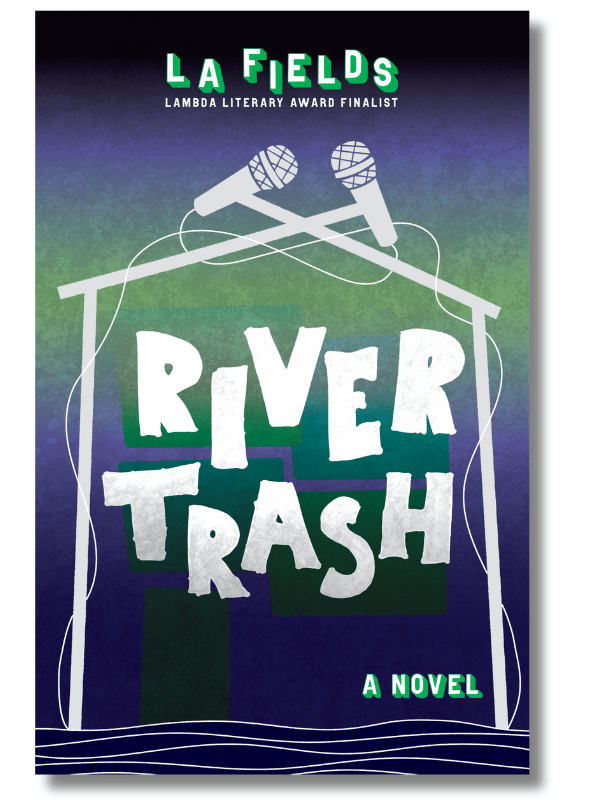River Trash
by L.A. Fields
Genre: Romance / LGBTQ
ISBN: 9781590217672
Print Length: 270 pages
Publisher: Lethe Press
Reviewed by Eric Mayrhofer
Sweet, sexy, and subtle—a striking portrayal of queer strength and resilience
It’s easy to think that performers have confidence and strength, that the love of the crowd fuels them. Years of dealing with hecklers have helped them build a thick skin, right? But don’t forget the old adage: happy clowns can be frowning on the inside.
That’s not exactly how things play out in L.A. Fields’ new romance River Trash, but it’s a good starting point.
At the center of the story are Graham and Whitney, two performers putting on a good face while dealing with personal struggles that, of course, threaten to get in the way of their happily ever after. Graham is a decertified nurse turned standup still figuring out how to get his act together (comedically and literally). Whitney is a musician who has worked his way back from addiction but still finds it standing in the way of the true human connection he craves. When they find each other in Louisiana during an outdoor gathering in the thick of the COVID-19 lockdown, they kindle a sweet, simmering romance that audiences will find a cozy joy in.
One of the book’s biggest strengths is its portrayal of not only romance but the real personal obstacles that Graham and Whitney face. For Whitney, those obstacles are an addiction tangling the highs of drug use with sexual satisfaction. Fields shares the road to recovery in passages where Whitney learns that “the challenge you’re conquering right now is that the more you try to separate out these two urges, to redifferentiate them, the more you think about them together.” The best writing isn’t always flashy. Thoughtful, easy-to-understand passages like these delicately show readers the strength someone in recovery must maintain.
That’s not to say Fields’ prose is lacking, though. When describing the beginning of Whitney’s addiction and a time when he was having sex with a man experiencing a meth high, he would see, “the wonder and sparkle in his eyes…that man was seeing stars, and Whitney wanted to see them too.” Fields’ quick beautiful asides make River Trash sparkle while giving readers a heartbreaking glimpse into a character who so longs for connection that he fell into addiction trying to find it.
Graham is just as lovable and deserving a hero as Whitney, but I’m focusing on Whitney possibly because the subtle, wonderful nuances to his character—“lovely,” Graham would call them—feel akin to the slow and wholesome buildup of their romance. There are steamy parts to keep readers moving along (Fields knows and delivers what romance fans want), but they never overshadow the accumulation of heartwarming episodes and rituals that help Graham and Whitney’s relationship evolve. “No more casual hookups,” Whitney says, “I’ve got to know people first. build some trust.” Fields lets him them do that, first through gentle kissing, then adopting a dog, and on and on. It’s casual and comfortable.
Better yet, Graham and Whitney’s relationship has the uncertainty of something young. When sharing with friends that they’ll be cuffing during lockdown, friends and family warn them those relationships don’t last, to which they each reply, in their separate ways, “Seasons of bondage rarely do.” That they enter the romance believing it won’t last makes it rawer and more compelling, and readers will race through the pages to see how that particular will-they-or-won’t-they energy plays out.
Sometimes the romance could feel a little spicier or more explicit, and here and there I found myself wanting the pace to pick up just a tad, but those are minor observations in the grand scheme of the novel. At its core, River Trash feels like a story about strength. Strength to go on despite the negative voices we hear in our heads, to find connection despite the pain we might inflict on ourselves for doing—to go on even when a pandemic’s existential threat looms in the background of our lives, ever-present.
At one point, Whitney and Graham are discussing the pandemic when Whitney says, “We’re coming up on forty years with HIV and AIDS, some pandemics never go away.” It’s a beautiful reminder in an LGBTQ romance that the queer community is made of survivors who can weather any storm—including those in the heart—and River Trash is a welcome story that gives two men the respite they deserve.
Thank you for reading Eric Mayrhofer’s book review of River Trash by L.A. Fields! If you liked what you read, please spend some more time with us at the links below.
The post Book Review: River Trash appeared first on Independent Book Review.
